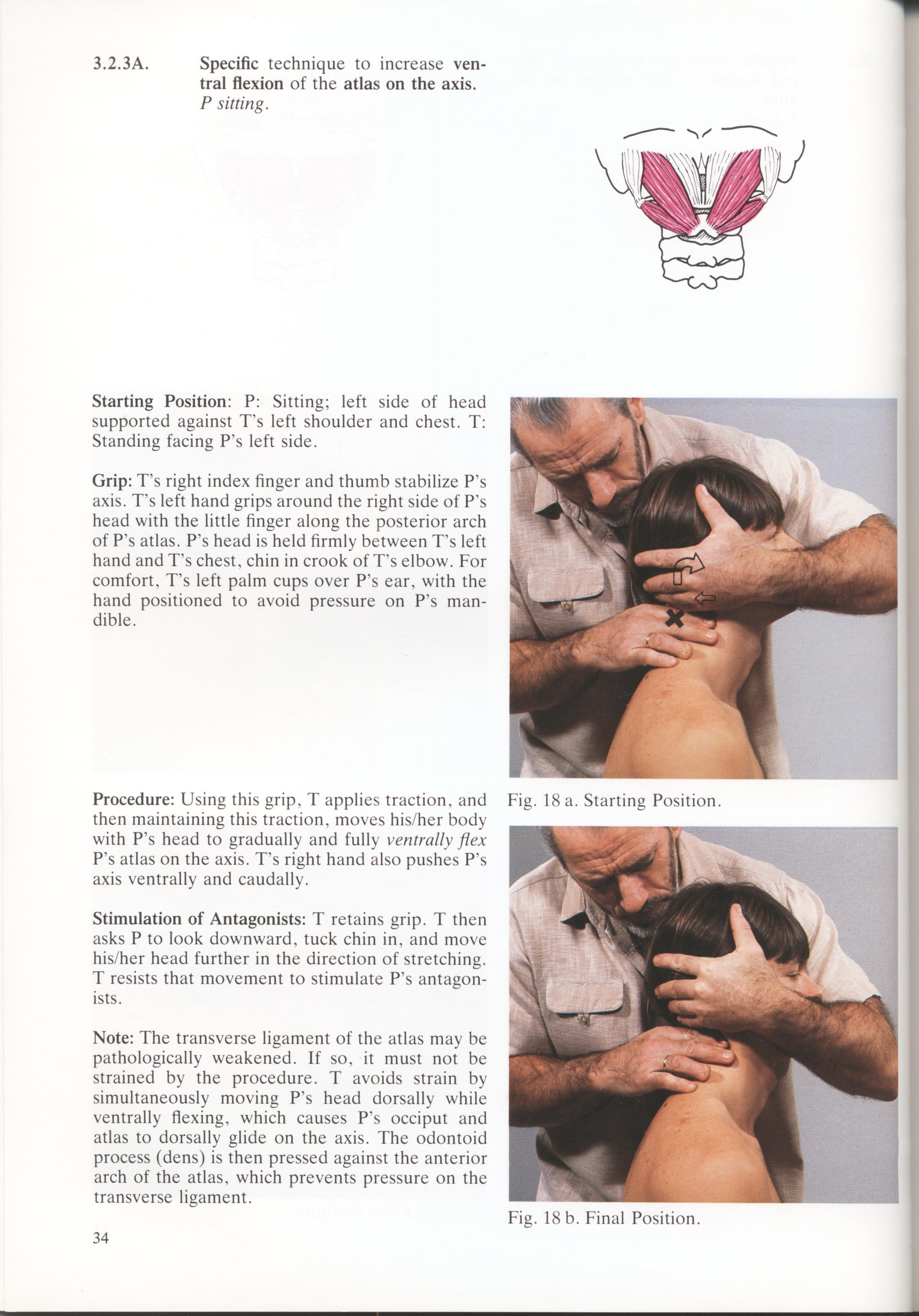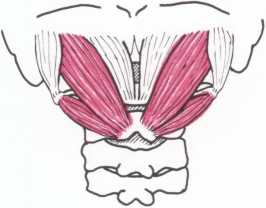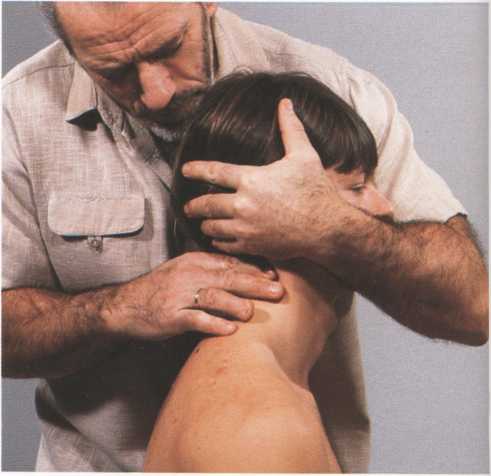34 (544)

3.2.3A.
Specific technique to increase ven-tral flexion of the atlas on the axis.
P sitting.


Starting Position: P: Sitting; left side of head supported against T's left shoulder and chest. T: Standing facing P’s left side.
Grip: T's right index finger and thumb stabilize P’s axis. T’s left hand grips around the right side of P’s head with the little finger along the posterior arch of P’s atlas. P’s head is held firmly between Ts left hand and T’s chest, chin in crook of Ts elbow. For comfort, T’s left palm cups over P’s ear, with the hand positioned to avoid pressure on P’s man-dible.

Fig. 18 b. Finał Position.
Procedurę: Using this grip, T applies traction, and Fig. 18 a. Starting Position. then maintaining this traction, moves his/her body with P’s head to gradually and fully ventrally flex P’s atlas on the axis. T’s right hand also pushes P’s axis ventrally and caudally.
Stimulation of Antagonists: T retains grip. T then asks P to look downward, tuck chin in, and move his/her head further in the direction of stretching.
T resists that movement to stimulate P’s antagonists.
Notę: The transverse ligament of the atlas may be pathologically weakened. If so, it must not be strained by the procedurę. T avoids strain by simultaneously moving P’s head dorsally while ventrally flexing, which causes P’s occiput and atlas to dorsally glide on the axis. The odontoid process (dens) is then pressed against the anterior arch of the atlas, which prevents pressure on the transverse ligament.
34
Wyszukiwarka
Podobne podstrony:
31 (637) 3.2.2A. Specific technique to increase ven-tral flexion of the occiput on the atlas. P sitt
32 (619) 3.2.2B. Specific techniąue to increase ven-tral flexion of the occiput on the atlas. P sitt
33 (623) 3.2.2C. Specific techniąue to increase ven-tral flexion of the occiput on the atlas. P supi
35 (522) 3.2.3B. Specific techniąue to increase ven-tral flexion of the atlas on the axis. P supine.
88 (153) 4.2.1. Specific technique to increase ven-tral glide of the mandible (j)rotru-sion). Inabil
99 (122) 5.2.2A. Specific techniąue to increase ven-tral flexion of Tl on T2. P supine. Starting Pos
36 (519) 3.2.4A. Specific technique to increase ven-tral flexion of C2 on C3. P sitting. Starting Po
37 (498) 3.2.4B. Specific techniąue to increase ven-tral flexion of C2 on C3. P supine. ► Starting P
90 (158) 4.2.3A. Specific technique to increase ven-tral and caudal movement of the mandible. Slight
42 (439) 3.3.2B. Specific technique to increase ven-tral flexion with rotation and lateral flexion t
43 (434) 3.3.2C. Specific technique to increase ven-tral flexion with rotation and Iateral flexion t
41 (472) 3.3.2A. Specific techniąue to increase ven-tral flexion with rotation and lateral flexion t
49 (372) 3.5.3A. Specific techniąue to increase dorsal flexion of the atlas on the axis. P. sitting.
58 (289) 3.6.1A. Non-specific techniąue to increase dorsal flexion with rotation and later-al flexio
60 (278) 3.6.2A. Specific technique to increase dorsal flexion with rotation and lateral flex-ion to
61 (265) 3.6.2B. Specific techniąue to increase dorsal flexion with rotation and lateral flex-ion to
62 (263) 3.6.2C. Specific techniąue to increase dorsal flexion with rotation and lateral flex-ion to
63 (253) 3.6.2D. Specific technique to increase dorsal flexion with rotation and lateral flex-ion to
64 (250) 3.7.1A. Non-specific technique to increase dorsal flexion with rotation to the right a
więcej podobnych podstron